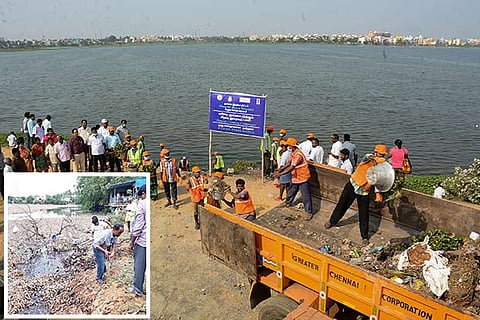

Chennai
This last summer, Chennaiites witnessed clouds of dust rolling off expanses of exposed lake beds. The drought prone city also bears the brunt of flooding after a spell of rain. Bothered by extreme weather disasters, several groups of residents across the city had taken up the challenge to restore their local waterbodies to maximise the yield from the northeast monsoon and also to avoid flooding. Their efforts have borne fruit this year as the lakes hold more quantities of clean water. However, residents of some neighbourhoods still face stiff resistance from PWD and local bodies.
One of the oldest citizens’ groups engaged in the restoration of waterbodies is Eco Society of India. Volunteers from this organisation are into their 39th week of restoring and cleaning the Selaiyur Lake. “A major problem we encountered when we took up the restoration was the number of bottles that were found in the lake bed,” said a volunteer.
Just a few weeks ago, the group collected around 85 sacks of plastic waste and 20 sacks of glass bottles from the waterbody and even removed water hyacinth. “As we complete a year, we have achieved visible improvement. Now, 90 per cent of the lake is clean. We were surprised when we collected only seven bags of waste from the lake. The residents have nearly stopped dumping garbage into the lake after witnessing our efforts every week,” said Darwin Annadurai, founder of Eco Society India. He said that the quality of water in the lake has improved when compared to previous years.
Similarly, Rajakilpakkam lake, which was originally spread over 105 acres, had reduced to just 30 acres over the years due to encroachments. In a bid to restore it, about 23 resident welfare associations joined hands and desilted it. Residents turned up in large numbers to take part in the restoration and cleaning activities which started in July.
“We got permission from the district Collector to desilt the waterbody. We have desilted one side of the lake already, but when we were about to proceed to the other side, we received a notice from the municipality that it will desilt the lake within a few days and asked us to stop our work,” said V Seetharaman, a member of Rajakilpakkam Residents’ Welfare Association. “During the recent rains, most of the houses on the non-desilted side of the lake were flooded. But the officials are yet to start the work that they promised,” he added.
Members of the same association had desilted Medavakkam lake two months ago and the bountiful rain after that has filled the lake to the brim. “We can see that the water is cleaner and there are no plastic bags or other waste materials floating at the edges of the lake,” Seetharaman said.
Tiruneermalai Lake, which is located in the suburbs of the city, is spread across 167 acres and has been severely polluted with garbage, sewage, and industrial waste for more than 15 years. Volunteers of Tiruneermalai Nanbargal Kuzhu had placed a proposal and they even got permission from the PWD officials to clean the lake in September. Apart from cleaning it, they are also creating public awareness on the importance of preserving the natural resource.
“Sewage and industrial waste are being dumped into the lake. But the officials have not taken any steps. They inspected the lake and said it will be restored soon and showed us the report which they submitted to the government. Since the PWD is taking a lot of time, we took the initiative to clean,” said Pugazhvendhan V, a member of Tiruneermalai Nanbargal Kuzhu.
“So far, we have removed almost all prosopis juliflora shrubs from near the lake. Now, only 10 per cent of the work is remaining and within a few weeks, we will be able to complete the work. We have asked the officials to desilt the lake or at least permit us to desilt it, but they have not started any work yet.
Recently, officials said that they will start the work only in May 2020,” he added. Indicating that the movement is gathering momentum, he said that many volunteers are coming forward for the initiative when compared to the mere eight volunteers in the first stage. “Apart from cleaning, each volunteer has contributed Rs 1,500 to clean the waterbody,” Pugazhvendhan said.
While residents of Tiruneermalai are facing only facing a partial resistance from the local authorities, in the northern suburb of Puzhal, residents have been denied permission to even clean waterbodies in their neighbourhood. “We had filed several complaints at the offices of the Corporation and PWD demanding the restoration of Puzhal channel, which has been polluted and neglected for more than five years. Though we volunteered to clean and desilt the waterbody, the officials denied permission claiming that they will do what is necessary,” said Karthikeyan, a resident of Red Hills.
Similarly, in Adambakkam, too, residents were not allowed to clean the lake. While welcoming the public initiative, PWD officials said that some of the waterbodies are parts of revenue contracts and so they cannot allow the public to take over the restoration work. Speaking to DT Next, K Ashokan, Chief Engineer of PWD, said, “We give permission to restore waterbodies if volunteers give a letter to the zonal Corporation. But voluntary cleanup of some waterbodies would affect State’s revenue sources.”
Another official said that the State government could earn revenue through desilting of lakes and selling the excess soil. “In such cases, we prevent locals from cleaning waterbodies to prevent misuse of the privilege,” he said.
Activists, however, said that the ideal solution would be a fifty-fifty participation where volunteers could work under the supervision of government officials, thus ensuring that the waterbodies are better maintained and there is no misuse of revenue.
Visit news.dtnext.in to explore our interactive epaper!
Download the DT Next app for more exciting features!
Click here for iOS
Click here for Android